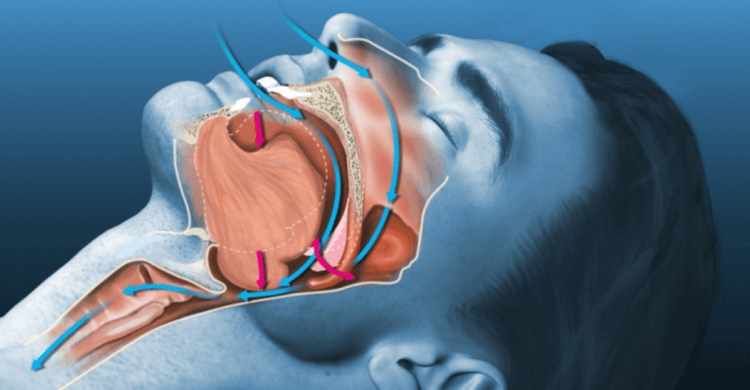Surely everyone has encountered another person’s snoring at least several times in their life and heard how loud it can be. But why does it wake up everyone around him, except the person who snores? It can be assumed that people have a blocked reaction to snoring, that is, the brain does not perceive it, as a result of which the snorer himself does not hear this sound. On the one hand, this is true, but some people still wake up from their snoring. In fact, the reason is more complex, and it may vary from person to person. Even within the same person, the ability to be awakened by one's own snoring may vary from night to night.
 People, as a rule, do not hear their own snoring, and there are several reasons for this
People, as a rule, do not hear their own snoring, and there are several reasons for this
Why do people snore in their sleep
h2>
Snoring occurs when air cannot pass through the nose or mouth properly. Due to the fact that a person's muscles are completely relaxed during sleep, the flow of inhaled air leads to vibration of the upper respiratory tract, which causes a characteristic sound. In scientific language this phenomenon is called rhonchopathy. It is common, affecting 57% of men and 40% of women worldwide.
Although snoring is a loud and annoying sound, it is most often harmless to the individual. However, sometimes snoring is a symptom of a dangerous syndrome known as apnea, which can lead to death. This type of snoring results in repeated pauses in breathing and suffocation throughout the night.
 Snoring occurs as a result of vibration in the upper respiratory tract due to air flow. Image source: remedium.ru
Snoring occurs as a result of vibration in the upper respiratory tract due to air flow. Image source: remedium.ru
Why do people sleep when they snore
The ability not to react to your own snoring — this is one of the mysteries of the human brain. One study showed that the sound volume during snoring reaches 110 dB. For comparison, dance music in a club or a working tractor from a distance of 1 meter has the same volume level. It would seem that it is impossible to sleep in such noise, but the person himself does not react to this sound.
But, as mentioned above, sometimes people still wake up from snoring. According to scientists, the effect of noise on sleep is likely multifactorial. That is, there are several factors on which the ability to wake up or not wake up from snoring depends.
Perhaps the most important of these factors — the ability of the brain to analyze noise even in sleep, as reported by Live Scince. This ability developed in us during evolution, and helped our ancestors survive. Thanks to it, they could distinguish white noise, that is, the sound of wind or rain, from threatening sounds, for example, those made by predatory animals.

The human brain does not react to its own snoring, since this sound does not pose a danger
Earlier we told you that in a dream our brain is even able to analyze and understand some words. For example, a person can hear his name in a dream and wake up, even if it is not pronounced very loudly, but at the same time not react to louder noises.
Thanks to this feature, we can sleep in noisy environments, such as on a train or on an airplane, but at the same time continue to monitor the situation around us by reacting to some other sounds. It is quite possible that the brain also perceives snoring as a constant sound that does not pose a danger.
Why do people sometimes wake up from their own snoring
So, if a person is able to “switch off” from his own snoring, then why does he sometimes still react to it? Most likely, the awakening threshold plays a certain role in this, that is, a person’s tendency to wake up from sleep at one time or another. When the awakening threshold is low, a person can wake up even from a slight noise, but if it is high, no noise can wake him up.

Most often people wake up during the rapid phase of sleep
The awakening threshold also depends on many factors. One of them is the sleep phase. During REM sleep, known as “rapid eye movement,” the sleep arousal threshold is lower than during non-REM sleep. At the same time, snoring intensifies during the REM phase of sleep. Because of this combination of both factors, people sometimes hear themselves snoring.
Other factors can also influence the sleep threshold. For example, if the sleep is restless and shallow, a person wakes up from any minor noises, including his own snoring. As practice shows, people most often wake up from their own snoring at the moment of falling asleep, that is, just at the moment when sleep is not yet deep. If a person has not slept for a long time and goes to bed very tired, his threshold for awakening is highly likely to be very high. Accordingly, a person in this case may snore heavily and not react to the sound he makes himself.
Do not forget to subscribe to our Zen and Telegram channels so as not to miss the most interesting and incredible scientific discoveries!
Finally, let us remind you that snoring is not the worst thing that can sometimes happen to a person in a dream. Earlier we told you that people often even die in their sleep, but snoring is not to blame for this. You can learn more about the reasons for this and ways to reduce the risk of death in your sleep by following the link.